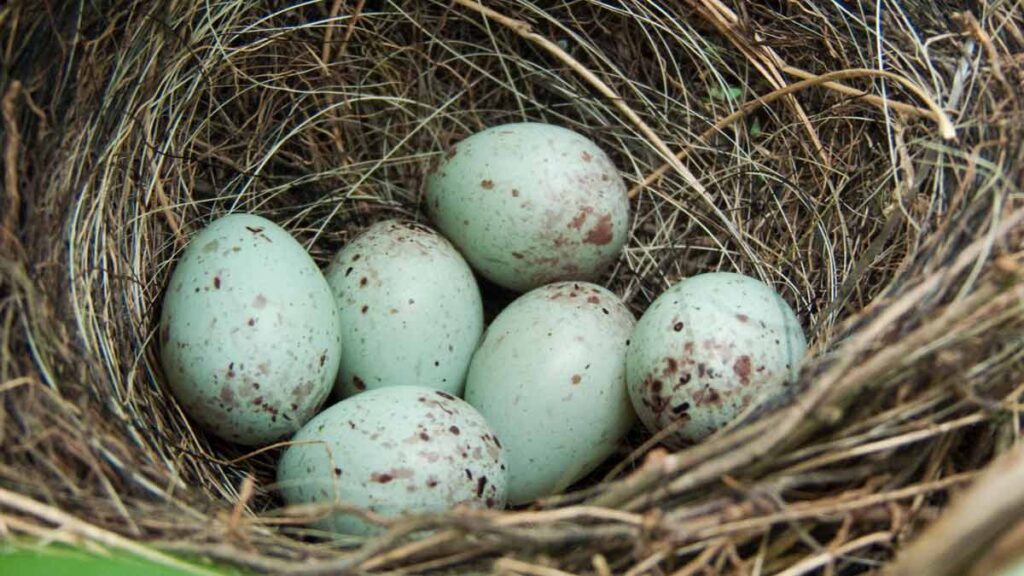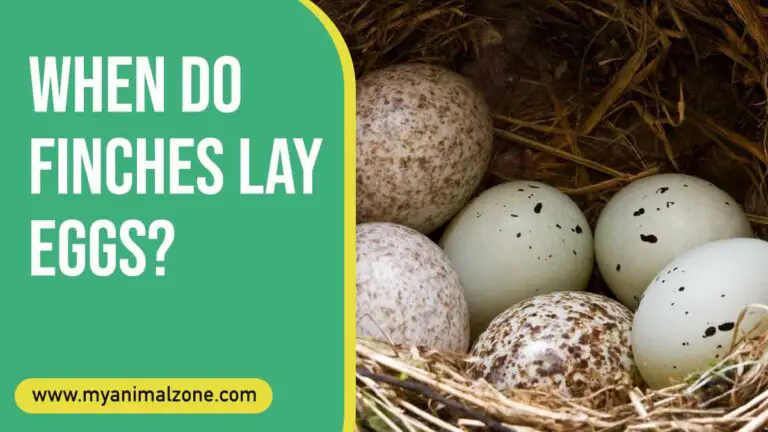Finches are small, seed-eating birds that are found in a variety of habitats throughout the world. Many species of finches vary in size, color, and behavior. Some finches are kept as pets, while others are popular among birdwatchers.
Finches generally lay their eggs in the springtime, although the timing can vary depending on the species and the location. For example, finches in tropical regions may lay their eggs year-round, while those in temperate areas typically lay their eggs from March to August.
The female finch will usually build a nest to lay her eggs. The nest is often made of grasses, twigs, and other materials and is sometimes lined with feathers or other soft materials. The female typically lays two to six eggs at a time, which she will incubate for twelve to fourteen days. Both parents will help to feed the young chicks once they hatch.
Fledging typically occurs when the chicks are three to four weeks old. At this point, they will leave the nest and begin to explore their surroundings. They will continue to be fed by their parents for several weeks after fledging before they learn to fend for themselves.
What You Need to Know About Finch Eggs
Finches lay eggs typically once a year during the breeding season. A clutch of eggs will usually take four to six, with the female laying one egg per day until the clutch is complete. The eggs are white and small, measuring about 0.5 inches long. Let’s learn more about finch eggs and how to care for them.
The Life Cycle of a Finch
Finches are social birds that live in flocks. Most finches mate for life, and pairs will work together to build a nest, incubate eggs and care for the young. Finches typically lay two to six eggs at a time, which hatch after about two weeks. The female will do most of the incubating while the male brings her food. Once the chicks hatch, both parents feed them until they are old enough to leave the nest, typically four to six weeks after hatching.
The Anatomy of a Finch Egg
Finch eggs are small and spherical and can be anywhere from pale blue to deep green, depending on the finch species. The eggs are incubated for about two weeks before hatching, and the young finches can fly within a few weeks.
The eggshell is thin and fragile, making it susceptible to damage from external sources such as predators or rough weather. Because of this, finch nests are often hidden away in dense vegetation or built in sheltered locations.
Finches typically lay between two and eight eggs, but some species may lay up to twelve. The incubation period and the number of young that hatch successfully will vary depending on the number of eggs in the clutch and the environmental conditions present during incubation.
Caring for Your Finch Eggs

Congratulations on your new feathered friends! Now that you have a nesting box and your girl is busy laying eggs, you may wonder what to do next. Here are some tips on how to take care of your finch eggs.
Collecting the Eggs
As soon as you know that your finches are going to lay eggs, you must be prepared to collect them. It is best to use a small, soft-bristled brush to lightly stroke the female’s back end and encourage her to relieve herself on the nesting material. Once she has done this, you can carefully pick up the egg and place it in an incubator. Be sure to handle the egg as little as possible, as you don’t want to remove the natural oils that protect it.
Incubating the Eggs
Once you have found a finch nest with eggs, you will need to remove the eggs and place them in an incubator. You can purchase an incubator or build one yourself. If you build your own, be sure that it is large enough to accommodate all of the eggs and that it will maintain a consistent temperature of 95 degrees Fahrenheit.
Use a small pair of tweezers or your fingers to remove the eggs from the nest. Gently lift each egg out of the nest and place it in the incubator. Once all the eggs are in the incubator, close them up and allow them to incubate for two weeks.
During this time, keeping the incubator clean and free of bacteria is essential. You should also turn the eggs several times daily to ensure they develop correctly. After two weeks, the chicks should start hatching. Then, allow them to dry off completely before removing them from the incubator.
Hatching the Eggs
Once your finch eggs have been laid, it will be up to you to hatch them. To do this, you must keep them at a consistent temperature of around 80 degrees Fahrenheit. You will also need to turn the eggs several times a day to prevent them from sticking to the sides of the incubator.
Finches typically lay anywhere from two to six eggs at a time. The incubation period for these eggs is about two weeks. Once the eggs have hatched, the baby finches must be fed every few hours until they are old enough to fend for themselves.
Caring for young finches can be a lot of work, but it is also gratifying. Seeing these beautiful creatures grow up and take flight is an experience you will never forget.
How Many Eggs Do Finches Lay?
Finches typically lay two to six eggs per clutch, with the more significant number being more common in the wild than in captivity. The eggs are white with brown spots and are about 0.5 inches (1.3 cm) long. Finch eggs hatch in about two weeks, and the young birds usually leave the nest after another two weeks.
When Do Finches Lay Eggs?
Finches generally lay four to six eggs simultaneously, though some species may lay up to eight. The female finch does all the incubating, which takes between 12 and 18 days, depending on the species. The male finch often brings her food during this time. Once the eggs hatch, both parents feed the chicks.
How Long Do Finch Eggs Take to Hatch?
Finch eggs take between 12 and 14 days to hatch. The female finch will lay between 2 and 7 eggs at a time, and she will incubate them for 12 to 14 days before they hatch. The male finch will often help with incubation, but it is the female’s responsibility to keep the eggs warm. After the eggs hatch, the chicks will be cared for by both parents until they are old enough to fend for themselves.
Conclusion
From what we can tell, most finches lay their eggs in the springtime. This makes sense, as this is when food is most plentiful, and the weather is generally more forgiving. Some species of finch, however, may lay their eggs a bit earlier or later in the year, depending on where they live and what conditions are like.

